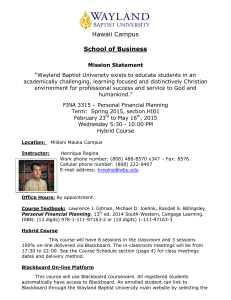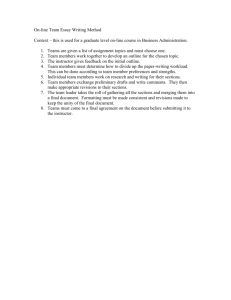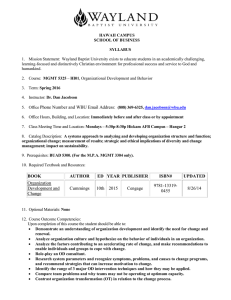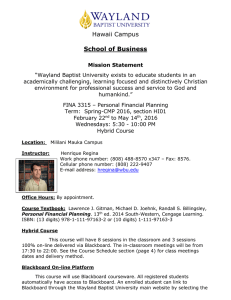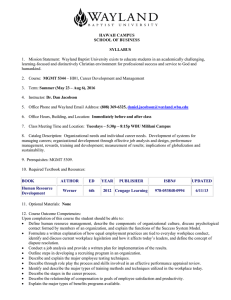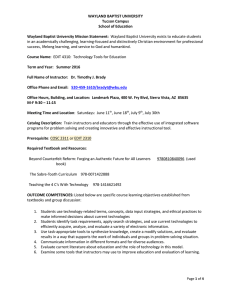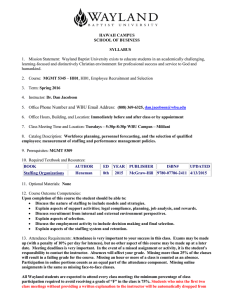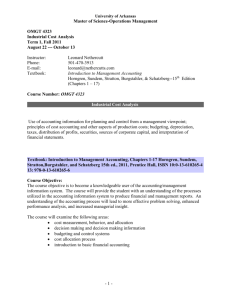Hawaii Campus School of Business
advertisement
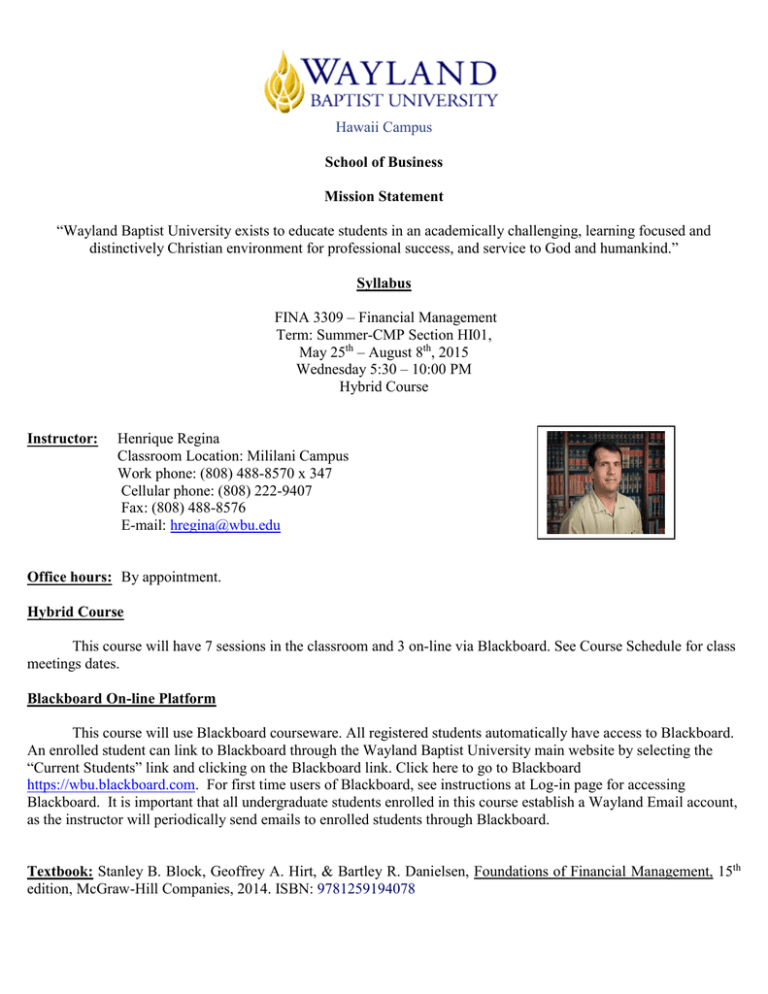
Hawaii Campus School of Business Mission Statement “Wayland Baptist University exists to educate students in an academically challenging, learning focused and distinctively Christian environment for professional success, and service to God and humankind.” Syllabus FINA 3309 – Financial Management Term: Summer-CMP Section HI01, May 25th – August 8th, 2015 Wednesday 5:30 – 10:00 PM Hybrid Course Instructor: Henrique Regina Classroom Location: Mililani Campus Work phone: (808) 488-8570 x 347 Cellular phone: (808) 222-9407 Fax: (808) 488-8576 E-mail: hregina@wbu.edu Office hours: By appointment. Hybrid Course This course will have 7 sessions in the classroom and 3 on-line via Blackboard. See Course Schedule for class meetings dates. Blackboard On-line Platform This course will use Blackboard courseware. All registered students automatically have access to Blackboard. An enrolled student can link to Blackboard through the Wayland Baptist University main website by selecting the “Current Students” link and clicking on the Blackboard link. Click here to go to Blackboard https://wbu.blackboard.com. For first time users of Blackboard, see instructions at Log-in page for accessing Blackboard. It is important that all undergraduate students enrolled in this course establish a Wayland Email account, as the instructor will periodically send emails to enrolled students through Blackboard. Textbook: Stanley B. Block, Geoffrey A. Hirt, & Bartley R. Danielsen, Foundations of Financial Management, 15th edition, McGraw-Hill Companies, 2014. ISBN: 9781259194078 Course Description: Role of the financial manager, the tax environment and its effects on business decisions, time value of money, cash and capital budgeting, financial statements, working capital, money markets and their regulators, monetary policy and its relation to the firm, and financial forecasting. Prerequisites: ACCT2305, or ACCT3307, or concurrent enrollment, or consent of school. Course Objectives: After the conclusion of this course, the student is expected to have good knowledge of topics such as: Identify the goals and functions of the financial manager Define the Time value of money and compute results for single amount and annuity present and future value problems Construct various pro forma financial statements and use them to develop financial forecast Explain working capital management. Assess risk management decisions and compute leverage measurements Explain the term structure of interest rates and discuss theories of interest rate determination List sources and types of short-term financing and explain selection criteria for the firm Identify capital market instruments and their characteristics; and valuate stock and bond prices and yields Compute the cost of capital for the firm including weighted average cost of capital Distinguish between the three methods of capital budgeting decisions and determine ranking criteria between investments projects Evaluate capital budgeting decisions under differing capital constrains Discuss theoretical approaches to risk measurement under single asset and portfolio conditions Describe the Capital Asset Pricing Model Discuss dividend policies and their impact on the value of the firm Discuss tax implications on financial management Course Requirements: General: Complete all assigned reading before the class as indicated on the attached course schedule, attend all classes, participate in class discussions, participate in the on-line discussion board forums and quizzes, complete all cases and take all exams. In case the student is unable to submit assignments on the due date, prior arrangements must be made with the instructor. Calculator: Calculator with the exponential key is required. A financial calculator is recommended. Attendance: Students enrolled at one of the university’s external campuses should make every effort to attend all class meetings. All absences must be explained to the instructor, who will then determine whether the omitted work may be made up. When a student reaches that number of absences considered by the instructor to be excessive, the instructor will so advise the student and file an unsatisfactory progress report with the external campus executive director/dean. Any student who misses 25 percent or more of the regularly scheduled class meetings may receive a grade of F in the course. Additional attendance policies for each course, as defined by the instructor in the course syllabus, are considered a part of the university’s attendance policy. A student may petition the Academic Council for exceptions to the above stated policies by filing a written request for an appeal to the executive vice president/provost. All Wayland students are expected to attend every class meeting; the minimum percentage of class participation required to avoid receiving a grade of “F” in the class is 75%. Students who miss the first two class meetings without providing a written explanation to the instructor will be automatically dropped from the roster as a “no-show.” Students who know in advance that they will be absent the first two class meetings and who wish to remain in the class must inform the instructor in order to discuss possible arrangements for making up absences. Grade Appeal: A basic aspect of the teaching-learning process is the evaluation of student performances and the assignment of grades. Student performance is evaluated solely on an academic basis, and not on opinions or conduct in matters unrelated to the course taken. Faculty are responsible for providing syllabi which clearly specify course objectives and/ or competencies, and for making clear the means of evaluation for purposes of grading students. Students are responsible for class attendance, for learning the content of any course of study and for those standards of academic performance established for a given course. Students who violate academic integrity and regulations by plagiarism, classroom misdemeanor, or academic dishonesty will be held accountable to faculty and may have their grades adjusted accordingly. Students shall have protection through orderly procedures against prejudices or capricious academic evaluation. A student who believes that he or she has not been held to realistic academic standards, just evaluation procedures, or appropriate grading, may appeal the final grade given in the course by using the student grade appeal process described in the Academic Catalog. Appeals may not be made for advanced placement examinations or course bypass examinations. Appeals are limited to the final course grade, which may be upheld, raised, or lowered at any stage of the appeal process. Any recommendation to lower a course grade must be submitted through the Executive Vice President/Provost to the Faculty Assembly Grade Appeals Committee for review and approval. The Faculty Assembly Grade Appeals Committee may instruct that the course grade be upheld, raised, or lowered to a more proper evaluation. Academic Honesty University students are expected to conduct themselves according to the highest standards of academic honesty. Academic misconduct for which a student is subject to penalty includes all forms of cheating, such as illicit possession of examinations or examination materials, forgery, or plagiarism. (Plagiarism is the presentation of the work of another as one’s own work.) Disciplinary action for academic misconduct is the responsibility of the faculty member assigned to the course. The faculty member is charged with assessing the gravity of any case of academic dishonesty and with giving sanctions to any student involved. Penalties that may be applied to individual cases of academic dishonesty include one or more of the following: 1. 2. 3. 4. 5. 6. 7. Written reprimand. Requirement to redo work in question. Requirement to submit additional work. Lowering of grade on work in question. Assigning the grade of F to work in question. Assigning the grade of F for course. Recommendation for more severe punishment (see Student Handbook for further information). The faculty member involved will file a record of the offense and the punishment imposed with the school dean, external campus executive director/dean, and the executive vice president/ provost. The executive vice president/provost will maintain records of all cases of academic dishonesty reported for not more than two years. Any student who has been penalized for academic dishonesty has the right to appeal the judgment or the penalty assessed. The appeals procedure will be the same as that specified for student grade appeals. (See Student Handbook for further information or, for external students, the external campus executive director/dean). Wayland Baptist University Statement on Plagiarism and Academic Dishonesty Writing is a collaborative art. Working out ideas for your paper with an instructor, writing tutor, classmate, family member, or friend is encouraged not only for this class, but also for other classes that involve writing. Discussion and collaborative brainstorming are good. However, passing off another's writing or ideas as your own is plagiarism. It is unethical, it constitutes Academic Dishonesty (cheating), and it is sufficient grounds both for failure of a course and suspension from the university. Common examples of plagiarism or academic dishonesty include the following: Copying any amount of text directly from an internet website, book, or other document without appropriate citation and synthesis into one’s own discussion. Paraphrasing the ideas presented in any source or oral discussion without appropriate citation. Using the evidence and conclusions of any source as the controlling framework for one’s own paper. Recycling work from a previous or current course, whether your own work or another student’s work. Purchasing or otherwise downloading a paper from an internet website. In some writing assignments, you will be expected to incorporate scholarly sources into your document. ALL OF THE FOLLOWING must be met to constitute appropriate citation of any source: Including MLA, Chicago, or APA parenthetical or note-style citation format as required by the instructor. Placing borrowed text directly from another source within “quotation marks.” Introducing clearly another author’s voice into the document by means of a signal phrase (an introduction of that author). Offering, in short, a clear distinction between one’s own voice or ideas and those of any outside authors brought into the discussion. Wayland Baptist University observes a ZERO TOLERANCE policy regarding Academic Dishonesty. Any suspected instance of academic dishonesty, including plagiarism, will first be evaluated by the instructor and discussed individually with the student. If the instructor determines that a student’s actions constitute Academic Dishonesty, the case will be filed with the dean of the School of Languages and Literature and reported to the university executive vice president/provost, as per university policy. Per university policy, second offenses RESULT IN SUSPENSION FROM THE UNIVERSITY. In this course, the first instance of Academic Dishonesty may also result in a zero on the assignment. Assessment/ Grading: Cases (20%) – There will be two cases study assignments where each student or group will submit their work. The case study format will be discussed in class. Each case study is worth 100 points. Exams (40%) – There will be a midterm exam and a final term exam. The exams will be consisted of multiple choices questions and problems involving calculations. Both midterm exam and the final exam are worth 200 points. The exams are open books and notes. Attendance (10%) – The student will earn 100 total points if attend, participate and cover all class assignments in each class session. Each class session will be worth 10 points. For the on-line sessions, the student will be required to complete all on-line assignments in order to earn 10 attendance points. On-line assignments/on-line sessions (30%) – Each on-line session will require the student to complete 3 discussion boards’ questions and one quiz. The discussion board questions are worth 45 points and the quiz is worth 55 points. Grade Scale: 90 to 100 % 80 to 89% 70 to 79% 60 to 69% 0 to 59% A B C D F Case Studies Midterm exam Final Exam Participation On-line Sessions Total 20% 20% 20% 10% 30% 100% Classroom Conduct Students who disrupt a class will be directed to leave immediately and report to the external campus executive director/dean or dean of students, who will discuss with the student the cause of the disruption. The student will return to the class only with permission of the executive director/campus dean or dean of students and faculty member involved. Services for Students with Disability: “In compliance with the Americans with Disabilities Act of 1990 (ADA), it is the policy of Wayland Baptist University that no otherwise qualified person with a disability be excluded from participation in, be denied the benefits of, or be subject to discrimination under any educational program or activity in the university. The Coordinator of Counseling Services serves as the coordinator of students with a disability and should be contacted concerning accommodation requests at (806) 291- 3765. Documentation of a disability must accompany any request for accommodations” Course Schedule Session Subject Introduction – Chapter 1. Financial Analysis & Planning – Chapter 2. 1 (May 27th, 2015) Financial Analysis & Planning – Chapters 3, 4. 2 (June 3rd, 2015) . 3 (June 10th, 2015) Financial Analysis & Planning – Chapter 5. Working Capital Management – Chapter 6. Case 1 due: Sun Microsystems – pg. 91 4 (June 17th, 2015) Working Capital Management – Chapters 7, 8 5 (June 24th, 2015) Capital Budgeting Process – Chapters 9, 10 Midterm Exam due 6 (July 1st, 2015) The Capital Budgeting Process – Chapter 11. Long-term Financing – Chapters 7 (July 8th, 2015) The Capital Budgeting Process – Chapter 13. Long-term Financing – Chapters 16. Case 2 due: Preston Products (Dividend valuation - P/E ratio) pg. 330 8 (July 15th, 2015) (On-line Session) Long-term Financing – Chapters 14, 15, 17. 9 (July 22nd, 2015) (On-line Session) Long-term Financing – Chapters 18, 19. Session 8 On-line Assignments Due 10 (July 29th, 2015) (On-line Session) Expanding the Perspective of Corporate Finance: 20, 21. Session 9 On-line Assignments Due 11 (August 5th, 2015) (No class meeting) Final Exam Due. Session 10 On-line Assignments Due

